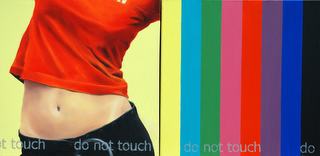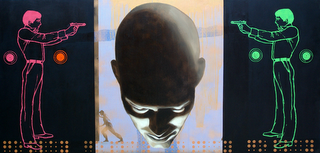Bangalore based artist Ravikumar Kashi's recent set of paintings previews in Bangalore on Dec 20, 2006. The exhibition will then travel to Chennai, Palo Alto - California (USA) and London, UK.
Since, I had to do a write-up for the Sunday Times of India, on a bright Sunday morning I braved the by-now ill-famous Bangalore traffic and met him at his studio. Over a cup of coffee, we discussed his art, the process by which he arrives at his compositions, his poetry and writings, Bangalore's promising art scene, contemporary Indian art in general and a lot more. The works were refreshing (and, so was the coffee) and I came away impressed with his interpretations of 'urban experiences'.
The following article was published today in TOI, Bangalore (Dec 17, 2006)
Paradox of Urbanisation
Since, I had to do a write-up for the Sunday Times of India, on a bright Sunday morning I braved the by-now ill-famous Bangalore traffic and met him at his studio. Over a cup of coffee, we discussed his art, the process by which he arrives at his compositions, his poetry and writings, Bangalore's promising art scene, contemporary Indian art in general and a lot more. The works were refreshing (and, so was the coffee) and I came away impressed with his interpretations of 'urban experiences'.
The following article was published today in TOI, Bangalore (Dec 17, 2006)
Paradox of Urbanisation
Bangalore based artist Ravikumar Kashi’s works offer remarkable insights into the paradoxical aspects of modernization and urbanization. The layers on his canvas reveal the intricacies and dynamics related to media excesses and social paradigms. Ravi takes inspiration from current events and his surroundings; he collects images and text that interest him. A look into his scrapbook reveals a fascinating collection of assorted images from advertisements, photographs and text from magazines and even email ids. His notebook is filled with rough sketches and scribbled notes, which then form the basis of his artworks.

Ravi has continuously evolved as an artist; over the years, he has experimented with various mediums - he has worked with paper pulp, found art, printmaking and glass painting in the past. And, now in the current series of paintings there is greater maturity where the visuals are more open-ended and encourage further viewer interaction. Incidentally, he has a Masters degree in printmaking from MS University, Baroda, and in English from Mysore University. A writer and a poet, Ravi has also published interviews with artists for newspapers.
What he is particularly adept at is in presenting the contrast or conflict between accepted norms as he combines unrelated images to magnify the non-apparent similarities and differences. The unraveling of layers and arriving at the inter-relation of separate frames in his paintings forms an exciting process by itself. ‘Happily ever after’ explores the relationship between a couple, where a pile of boxes on the lower side of the canvas hints at revealing new surprises in the relationship when pulling out each box. ‘Say something’ depicts a corpse like figure completely still and static with an overlapping flight map that talks about movement and connectivity. The irrelevance of tickers on the television screen on news channels talks about segmented viewing, and compartmentalization of our lives in general. According to Ravi Kashi, “Often we see an advertisement of a beauty product on one page of a magazine with a model turned out exquisitely, while on the opposite page is an image of a young girl suffering from draught.” The incongruity of events and images in media is what influences Ravi in his art.

On one hand the society abhors violence and killing, and at the same time most videogames (even for children) allow them to score points based on the number of killings made! His large 10 x 5 feet work titled ‘Go Play’ deals with this theme. The painting raises issues of morality and the society’s response in varying scenarios. The other works are also along similar lines; they deal with notions of power, urban stress, expectations, consumerism, materialism and so on. Most of his paintings have textual messages that highlight the absurdity of urban patterns. The text varies from Morse code, Braille, sign language, email ids and even banner ads.
Another set of visuals made in paper pulp forms a separate collection akin to pages from a journal. These combine images and text in random order and are also based on contemporary topics. Occupying an informal space in the exhibition, these are equally thought provoking and raise pertinent questions on urban trends.
The exhibition begins on December 20 at Gallery Sumukha, Bangalore.